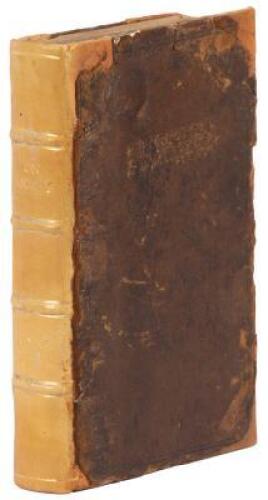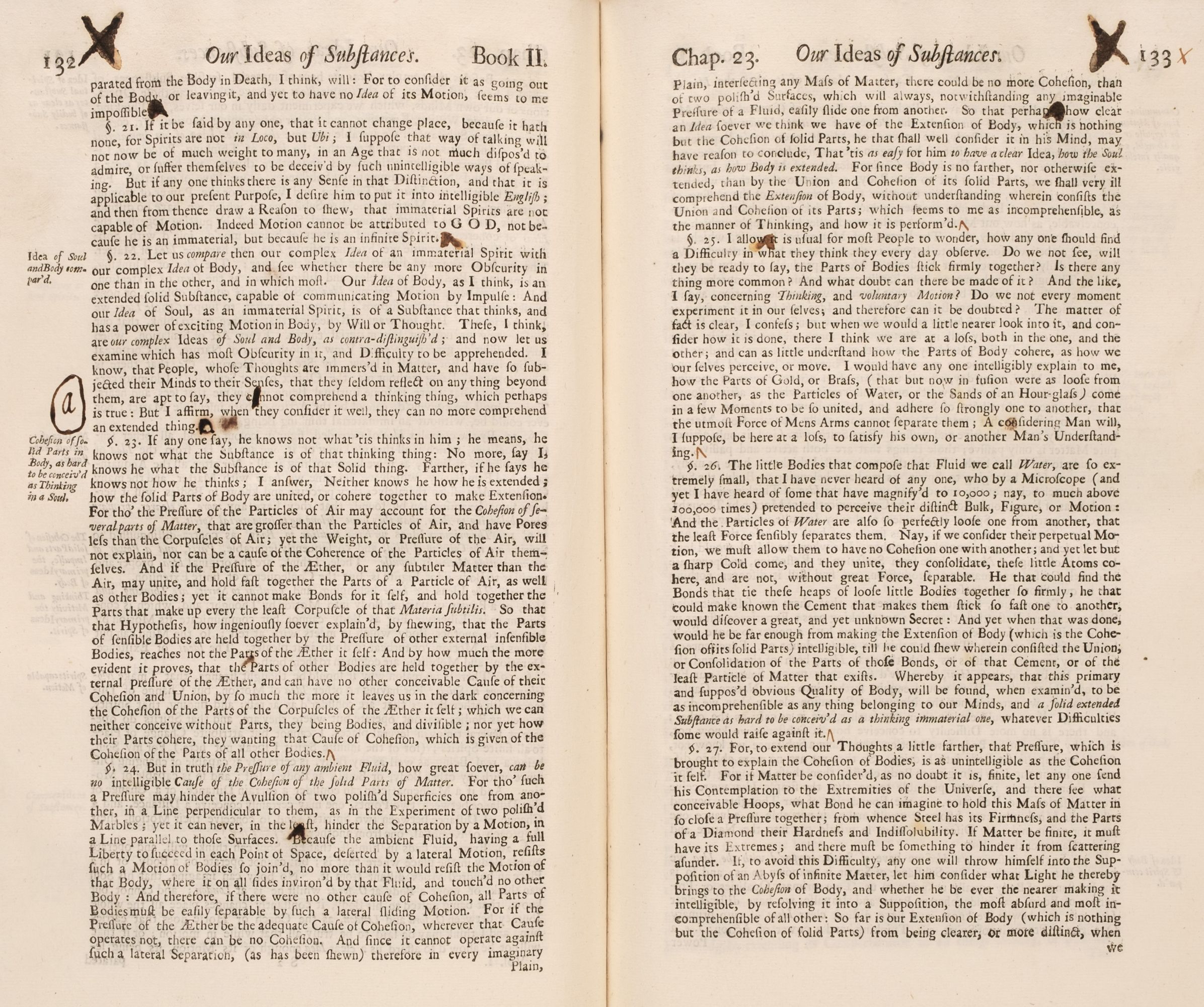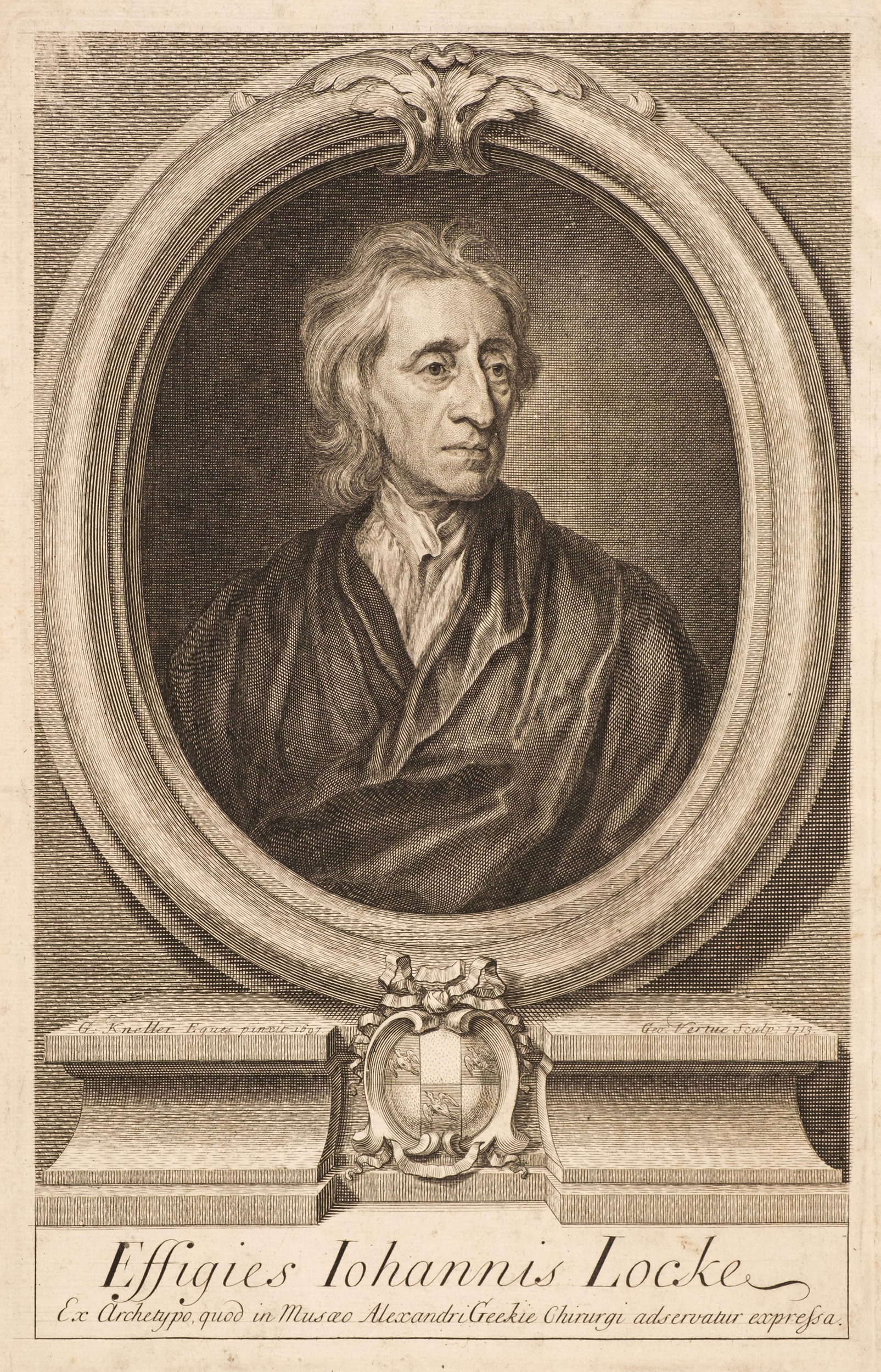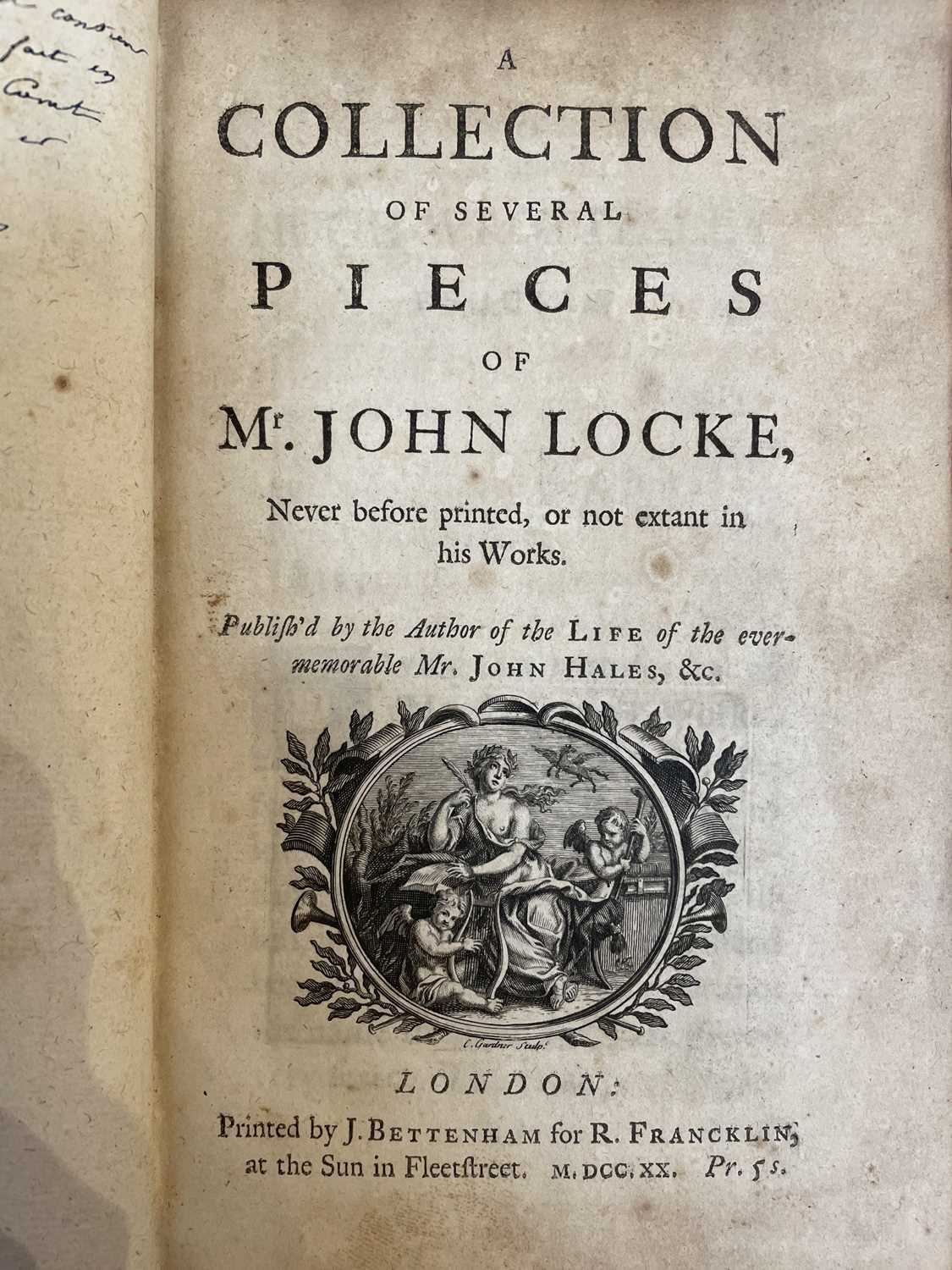Epistola de tolerantia ad Clarissimum Virum T.A.R.P.T.O.L.A. Scripta à P.A.P.I.O.L.A. Gouda, apud Justum ab Hoeve, 1689. 12°. 96 S. Pp. d. 19. Jh. (etwas bestoßen und beschabt). Philosophie und Soziologie – Seltene erste Ausgabe von Locke's einflussreichem Werk, ein Plädoyer für religiöse Toleranz, in dem er seine Überzeugung zum Ausdruck bringt, dass Kirche und Staat unterschiedliche Funktionen erfüllen und daher in getrennten Institutionen angesiedelt sein sollten. - Harrison & Laslett 2941 - Attig 41 - PMM S. 308 - Lockes erstes separat erschienenes Werk, anonym erschienen. Ludwig XIV. hatte im Oktober das Edikt von Nantes widerrufen und damit die letzten Reste der Toleranz für die französischen Protestanten beseitigt. Die Epistola de tolerantia wurde nach Lockes Rückkehr aus Kleve etwa Anfang November geschrieben. Der "Limburgius", an den De tolerantia gerichtet ist, ist Philippus van Limburgch (1633-1712), der bekannte niederländische Denker und Korrespondent von Locke, der für die Veröffentlichung dieses Traktats verantwortlich war. Das Manuskript wurde an den Drucker geschickt, nachdem Locke im Februar 1689 (im Gefolge von Wilhelm III.) aus dem Exil nach England zurückgekehrt war. Die Veröffentlichung erfolgte Anfang Mai desselben Jahres, also mehr als drei Jahre nach der eigentlichen Abfassung und nur wenige Monate vor der Veröffentlichung einer englischen Übersetzung von William Popple. - 3 Werke beigebunden: 1. Vorgebunden: Thou, Jacques Auguste de (Thuanus, J.A.), Nec non aliorum ex ordine tam ecclesiastico quam politico virorum in Gallia eminentissimorum judicia ... O.O. u. Dr., 1686. 12°. 78 S. - Sehr selten, laut KVK nur in 3 Bibliotheken (nicht in Deutschland). - Nachgebunden: F.M.M., Otium hyemale vespertinum de comparanda fidei unione pontificiorum evangelicorum ac reformatorum. O.O. u. Dr., 1706. 12°. 69 S. - Sehr selten, laut KVK nur in 1 Bibliothek. - Nachgebunden: Nonnemo a nonnemine in causa Syncretismi insulse detecti et insulsius anecti confutatus. O.O. u. Dr., 1669. 12°. 46 S. - Sehr selten. Laut KVK nur in 1 Bibliothek. Philosophy and Sociology – Rare first edition of Locke's influential work, a plea for religious toleration, in which he expresses his belief that church and state serve different functions and should therefore be located in separate institutions. - Harrison & Laslett 2941 - PMM p. 308 - Locke's first separately published work, published anonymously. Louis XIV had revoked the Edict of Nantes in October, removing the last vestiges of toleration for French Protestants. The Epistola de tolerantia was written after Locke's return from Cleves around the beginning of November. The "Limburgius" to whom De tolerantia is addressed is Philippus van Limburgch (1633-1712), the well-known Dutch thinker and correspondent of Locke, who was responsible for the publication of this treatise. The manuscript was sent to the printer after Locke returned to England from exile in February 1689 (in the wake of William III). It was published in early May of the same year, more than three years after it was actually written and only a few months before the publication of an English translation by William Popple. - Bound with 3 titles: 1. J.A. Thou, Nec non aliorum ex ordine tam ecclesiastico. 1686 - 2. anonymous: F.M.M. Otium hyemale vespertinum de comparanda fidei. 1706 - 3. anonymous: Nonnemo a nonnemine in causa Syncretismi. 1669 - All 3 titles very rare, only in a few libraries worldwide.
Epistola de tolerantia ad Clarissimum Virum T.A.R.P.T.O.L.A. Scripta à P.A.P.I.O.L.A. Gouda, apud Justum ab Hoeve, 1689. 12°. 96 S. Pp. d. 19. Jh. (etwas bestoßen und beschabt). Philosophie und Soziologie – Seltene erste Ausgabe von Locke's einflussreichem Werk, ein Plädoyer für religiöse Toleranz, in dem er seine Überzeugung zum Ausdruck bringt, dass Kirche und Staat unterschiedliche Funktionen erfüllen und daher in getrennten Institutionen angesiedelt sein sollten. - Harrison & Laslett 2941 - Attig 41 - PMM S. 308 - Lockes erstes separat erschienenes Werk, anonym erschienen. Ludwig XIV. hatte im Oktober das Edikt von Nantes widerrufen und damit die letzten Reste der Toleranz für die französischen Protestanten beseitigt. Die Epistola de tolerantia wurde nach Lockes Rückkehr aus Kleve etwa Anfang November geschrieben. Der "Limburgius", an den De tolerantia gerichtet ist, ist Philippus van Limburgch (1633-1712), der bekannte niederländische Denker und Korrespondent von Locke, der für die Veröffentlichung dieses Traktats verantwortlich war. Das Manuskript wurde an den Drucker geschickt, nachdem Locke im Februar 1689 (im Gefolge von Wilhelm III.) aus dem Exil nach England zurückgekehrt war. Die Veröffentlichung erfolgte Anfang Mai desselben Jahres, also mehr als drei Jahre nach der eigentlichen Abfassung und nur wenige Monate vor der Veröffentlichung einer englischen Übersetzung von William Popple. - 3 Werke beigebunden: 1. Vorgebunden: Thou, Jacques Auguste de (Thuanus, J.A.), Nec non aliorum ex ordine tam ecclesiastico quam politico virorum in Gallia eminentissimorum judicia ... O.O. u. Dr., 1686. 12°. 78 S. - Sehr selten, laut KVK nur in 3 Bibliotheken (nicht in Deutschland). - Nachgebunden: F.M.M., Otium hyemale vespertinum de comparanda fidei unione pontificiorum evangelicorum ac reformatorum. O.O. u. Dr., 1706. 12°. 69 S. - Sehr selten, laut KVK nur in 1 Bibliothek. - Nachgebunden: Nonnemo a nonnemine in causa Syncretismi insulse detecti et insulsius anecti confutatus. O.O. u. Dr., 1669. 12°. 46 S. - Sehr selten. Laut KVK nur in 1 Bibliothek. Philosophy and Sociology – Rare first edition of Locke's influential work, a plea for religious toleration, in which he expresses his belief that church and state serve different functions and should therefore be located in separate institutions. - Harrison & Laslett 2941 - PMM p. 308 - Locke's first separately published work, published anonymously. Louis XIV had revoked the Edict of Nantes in October, removing the last vestiges of toleration for French Protestants. The Epistola de tolerantia was written after Locke's return from Cleves around the beginning of November. The "Limburgius" to whom De tolerantia is addressed is Philippus van Limburgch (1633-1712), the well-known Dutch thinker and correspondent of Locke, who was responsible for the publication of this treatise. The manuscript was sent to the printer after Locke returned to England from exile in February 1689 (in the wake of William III). It was published in early May of the same year, more than three years after it was actually written and only a few months before the publication of an English translation by William Popple. - Bound with 3 titles: 1. J.A. Thou, Nec non aliorum ex ordine tam ecclesiastico. 1686 - 2. anonymous: F.M.M. Otium hyemale vespertinum de comparanda fidei. 1706 - 3. anonymous: Nonnemo a nonnemine in causa Syncretismi. 1669 - All 3 titles very rare, only in a few libraries worldwide.















Testen Sie LotSearch und seine Premium-Features 7 Tage - ohne Kosten!
Lassen Sie sich automatisch über neue Objekte in kommenden Auktionen benachrichtigen.
Suchauftrag anlegen